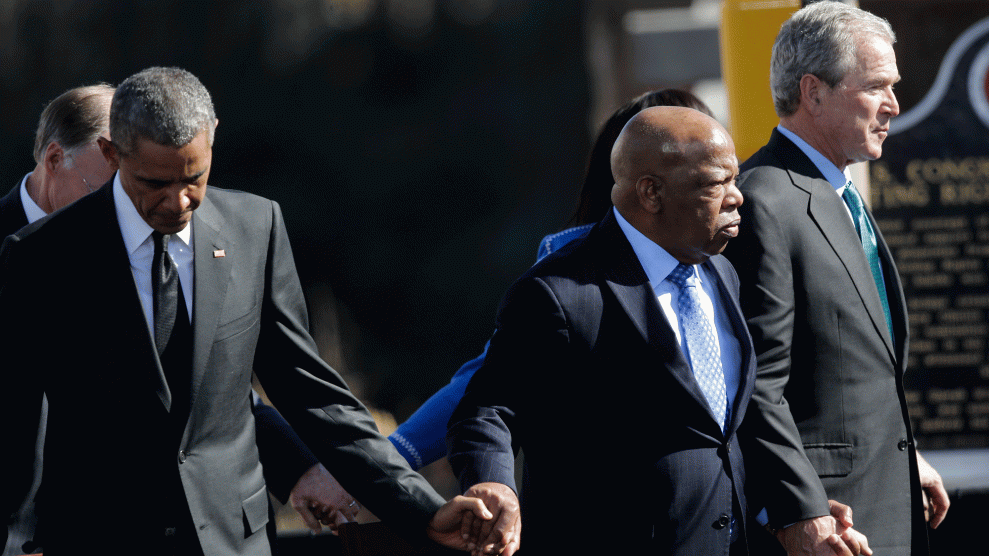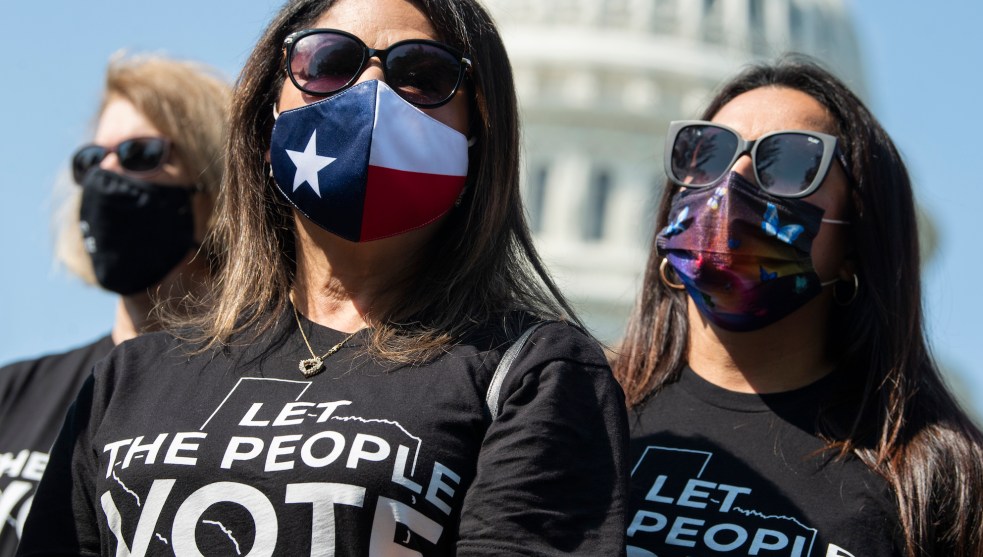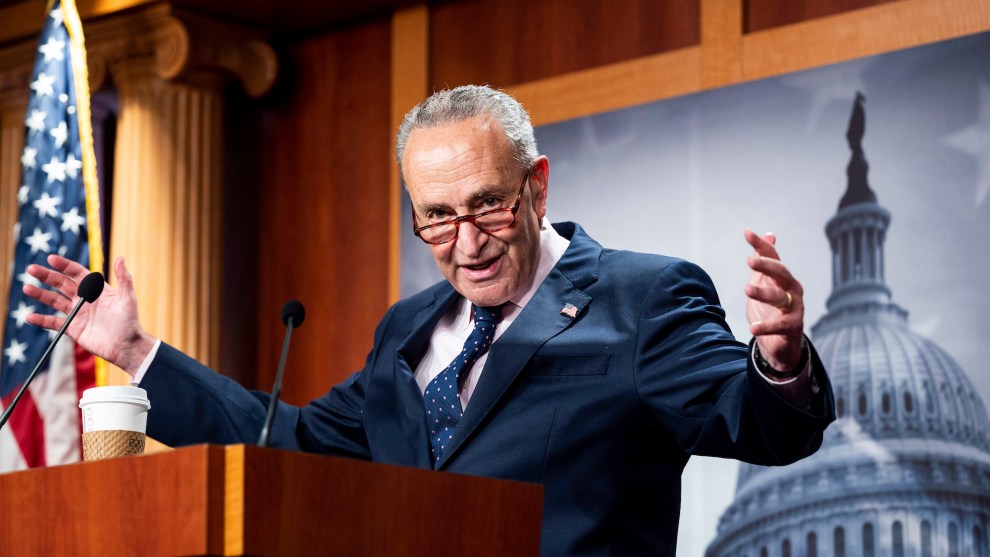
Barack Obama, the late John Lewis, and Former President George W. Bush hold hands for a prayer after Obama spoke near the Edmund Pettus Bridge in Selma, Alabama, on the 50th anniversary of "Bloody Sunday."Gerald Herbert/AP
On Wednesday afternoon, GOP senators blocked Democrats from advancing a key voting rights bill, the John Lewis Voting Rights Advancement Act, marking the second time in two weeks and the fourth time this year that Republicans have filibustered voting rights legislation that would combat GOP voter suppression efforts. Senate Majority Leader Chuck Schumer (D-N.Y.) called it a “low, low point in the history of this body.”
Republicans have now prevented three different voting rights bills introduced by Democrats from reaching the Senate floor. This repeated obstruction is likely to embolden top Democrats, including President Joe Biden, to push for reforming the filibuster to pass voting rights legislation. For months, the president has shied away from this fight, but in recent weeks he has signaled a new willingness to address the abuse of the filibuster, since it’s now abundantly clear that Democrats can protect voting rights or the filibuster, but not both.
Republicans first blocked the Democrats’ sweeping democracy reform bill, the For the People Act, from reaching the Senate floor in June and again in August. Democrats spent months negotiating a revised version of the bill, the Freedom to Vote Act, with Senator Joe Manchin (D-W. Va.), who courted GOP senators but found no takers, as Republicans unanimously filibustered the bill on October 20. Now Republicans have blocked legislation to restore the landmark Voting Rights Act of 1965, named after civil rights icon John Lewis, who was beaten and nearly died marching for voting rights, even though GOP senators unanimously voted to reauthorize the VRA in 2006 and heaped praise on Lewis when he passed away in July 2020.
Republicans once strongly supported the VRA. All four reauthorizations of the law—in 1970, 1975, 1982, and 2006—passed the Congress with overwhelming bipartisan support and were signed into law by Republican presidents. The 2006 reauthorization passed the Senate 98-0. Yet one only GOP senator, Lisa Murkowski of Alaska, voted for the John Lewis bill on Wednesday, a striking example of just how much the GOP has renounced its past support for voting rights. “It is dangerous to let voting rights become a wholly partisan issue,” she said on Wednesday.
The John Lewis bill would restore the VRA after it was gutted by the Supreme Court in 2013 in Shelby County v. Holder, requiring that any state with a history of voting discrimination within the past 25 years seek federal approval before making changes to its voting procedures. That formula would initially apply to eight Southern states with a long history of voting discrimination—Alabama, Florida, Georgia, Louisiana, Mississippi, North Carolina, South Carolina, and Texas—according to data compiled by voting rights historian Peyton McCrary.
The bill would further mandate that any state, regardless of its history, obtain clearance from the Justice Department or a federal court in Washington, DC, before making voting changes in jurisdictions with growing minority populations that tend to burden voters of color, such as strict voter ID laws or closing polling places. It would also counteract a Supreme Court decision in July that further weakened the voting rights law.
A Mother Jones analysis in June found that 26 states have enacted new restrictions on voting since the Supreme Court gutted the VRA in 2013, providing a strong rebuttal to Chief Justice John Roberts’s contention that “things have changed dramatically” since the law’s enactment.
8 years ago today Supreme Court gutted Voting Rights Act
“Things have changed dramatically” wrote John Roberts
But after Shelby County decision 26 STATES have enacted new restrictions on voting
We crunched the numbers https://t.co/uPttnenaeo pic.twitter.com/EztCx9MNcC
— Ari Berman (@AriBerman) June 25, 2021
Sixteen GOP senators—including Senate Minority Leader Mitch McConnell—voted to reauthorize the VRA in 2006 but opposed the John Lewis bill. “If it ain’t broke, don’t fix it,” McConnell said about the VRA in 2006. “This is a good piece of legislation which has served an important purpose over many years.” When Lewis passed away last year, McConnell shared a story about singing “We Shall Overcome” with Lewis at a ceremony honoring Martin Luther King Jr. at the US Capitol. Yet McConnell said in June “there’s no threat to the voting rights law,” even though the Supreme Court has all-but-obliterated the VRA in the past decade and 19 states have enacted 33 new laws restricting voting access this year. In 2015, GOP senators Susan Collins (R-Maine), Rob Portman (R-Ohio), and Tim Scott (R-S.C.) traveled with Lewis to Selma, Alabama on the 50th anniversary of Bloody Sunday (I also attended that trip) but voted on Wednesday to block the law bearing his name.
Given this intransigence, there’s an increasing recognition among Democratic leaders that they will have to go-it-alone to protect voting rights, just like radical Republicans did during Reconstruction when they passed the 15th Amendment enshrining the right to vote free of racial discrimination over the unanimous opposition of segregationist Democrats. After Republicans blocked a debate on the Freedom to Vote Act, Chuck Schumer said that “the Senate needs to be restored to its rightful status as the world’s greatest deliberative body.” The next day, Biden said at a CNN town hall that “we’re going to have to move to the point where we fundamentally alter the filibuster” and said he would be open to doing away with it to pass voting rights legislation “and maybe more.” Following that, White House press secretary Jen Psaki said that “not getting voting rights done is not an option” and that Biden “will have more to say about this in the coming weeks.”
Whether proposals to reform the filibuster—ranging from exempting voting rights legislation from the 60-vote requirement to forcing the minority party to stand on the Senate floor and continuously speak to block legislation—will gain the support of Joe Manchin and Kyrsten Sinema, who have steadfastly supported the filibuster, remains to be seen. But now it seems clearer that Biden and Schumer will at least try.
However, Biden also admitted during the CNN town hall that if he got into a debate over the filibuster “I lose at least three votes right now to get what I have to get done on the economic side of the equation” and protracted negotiations over the president’s Build Back Better plan are keeping Democrats from devoting their full attention to protecting voting rights. The Democrats huge losses in Virginia on Tuesday could also make some Democrats squeamish about tinkering with the filibuster if they think Republicans will retake the Senate in 2022.
Regardless of the politics, the filibuster continues to distort all notions of representative government: the 51 senators who supported the John Lewis bill represent 44.2 million more Americans than the 48 senators who opposed it, according to data provided by Alex Tausanovitch of the Center for American Progress, but voting rights legislation has repeatedly been blocked by 41 GOP senators representing just 21 percent of the US population. (The vote was technically 50-49, because Schumer switched from a yes to a no vote for procedural reasons so he could bring the legislation back up at another time.)
At Lewis’ funeral in Atlanta in July 2020, former President Barack Obama made an impassioned case for eliminating the filibuster to pass the John Lewis bill. “You want to honor John?” Obama said. “Let’s honor him by revitalizing the law that he was willing to die for.” Obama added that “John wouldn’t want us to stop there” and called for policies like automatic voter registration, expanding early voting, banning partisan gerrymandering, and admitting Washington, D.C. and Puerto Rico as new states to create a more representative government. “If all this takes eliminating the filibuster—another Jim Crow relic—in order to secure the God-given rights of every American, then that’s what we should do,” Obama said.
“I strongly urge President Biden to end the Senate filibuster to ensure passage of this vital voting rights legislation,” Dr. Bernice King, the youngest daughter of Martin Luther King Jr. and CEO of the King Center, told me. “On its face, the filibuster is not unjust. However, when it is used to intentionally deter and dismantle efforts for equity, social change, and equality, it is a just law being used unjustly.”
Democrats have mere weeks to act before GOP efforts to rig the political system in their favor through voter suppression, elections subversion, and extreme gerrymandering prove insurmountable. “Time is really getting short for the Senate to take action on voting rights before Americans go to the polls in the 2022 elections,” Schumer said this week.
Key GOP-controlled states have already passed new laws that make it harder for Democratic constituencies to vote and impede the administration of fair elections, and they are well on their way to passing gerrymandered maps that will entrench Republican control of state politics for the next decade and help the party regain the House in 2022.
It truly is now or never for democracy.













